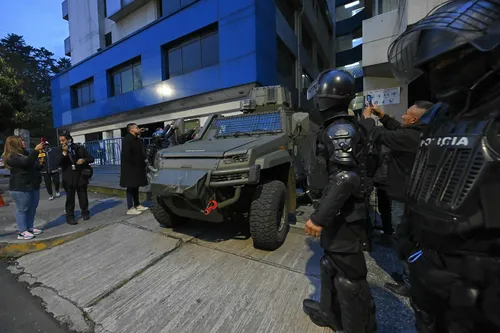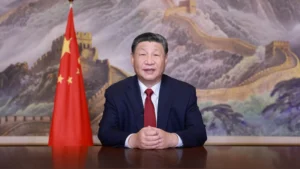
The former vice president of Ecuador, Jorge Glas, was taken to a maximum security detention center. He had been taking refuge since December last year at the Mexican embassy in Quito, the Ecuadorian capital.
Last Friday (5), police officers invaded the building to detain Glas. In a statement, the office of the country’s president, Daniel Noboa, reported that the former vice president would be “made available to the competent authorities.”
After being detained in an arrest unit in the capital itself, he was transferred to the port city of Guayaquil. There, he was taken to Deprivation of Liberty Center nº3, also known as La Roca (the stone).
The invasion of the embassy was harshly condemned by politicians and social movements from different parts of the world. According to the head of Mexico’s Ministry of Foreign Affairs and Political Affairs in Quito, Roberto Canseco, the police attacked him during the action.
“They threw me to the ground. I tried to physically prevent them from entering, but like criminals they invaded the Mexican embassy in Ecuador. That’s not possible, that can’t be, it’s crazy,” Canseco told the Ecuadorian press.
‘Dictatorship, barbarism and fascism’: politicians and movements react to the arrest of Jorge Glas
In statements made to Brasil de Fato, professor of political sociology Franklin Ramírez, from the Facultad Latinoamericana de Ciencias Sociales, classified the situation as very serious and unprecedented in the region.
“Not even in the worst dictatorships of the Southern Cone, not (Augusto) Pinochet (dictator of Chile from 1973 to 1990), or (Jorge Rafael) Videla (dictator of Argentina between 1976 and 1981) dared to go so far. It is an aggression , an occupation of foreign territory, a kidnapping of a political exile.”
According to the professor, the action has the potential to cause disruptions in regional politics. “It is an act that assumes all the international political gravity of human rights under international law. Ecuador will suffer very serious consequences from this situation.”
He also mentioned the possibility of American interference or influence in the situation. “I don’t think Noboa would have done something like this without permission or, at least, tacit endorsement from the United States. In this way it can be seen that there is a maneuver to alter and disorder regional politics.”
The president of Mexico reacted immediately and broke diplomatic relations with Ecuador. López Obrador published on social media that the measure was a “flagrant violation of international law and Mexico’s sovereignty.”
This Sunday (7), the European Union’s head of foreign policy, Josep Borrell, also condemned the action. According to him, the Ecuadorian government failed to comply with the 1961 Vienna Convention, which determines that embassies are inviolable territory.
I condemn the violation of the facilities of the Mexican Embassy in Quito in a clear breach of the 1961 Vienna Convention.
I call for respect for international diplomatic law.
— Josep Borrell Fontelles (@JosepBorrellF) April 7, 2024
Through social networksinternational politics expert Oswaldo Moreno Ramírez, who heads the Independent Political Consultants of Latin America network, stated that the Ecuadorian government will have to mobilize its entire diplomatic front to “defend the indefensible” in front of international organizations.
He recalled that the invasion could even have economic consequences, since Mexico is the country with the most investments in Ecuador and has the most Ecuadorians in transit around the world.
“The mistake has already been made, but unfortunately, it’s like a plane. The pilot, rightly or wrongly, entered a storm, opening a totally unnecessary front. But it turns out we’re all on the plane.”
For the Ecuadorian journalist Luis Dávila Loor, the attitude of the Ecuadorian government could lead Daniel Noboa to lose political support and harm himself electorally. “He managed to make people who supported him leave. Ecuador is in the hands of an authoritarian who thinks with his liver.”
The political scientist Pablo Medina Pérez, from the Universidad San Francisco de Quito, compiled all the statements from the nations of the American continent regarding the case. In the publications it is clear that the action of the Ecuadorian government was unanimously condemned. “Rarely has America agreed so much on something. Ecuador has united them to condemn him.”
Editing: Raquel Setz

Source: www.brasildefato.com.br

